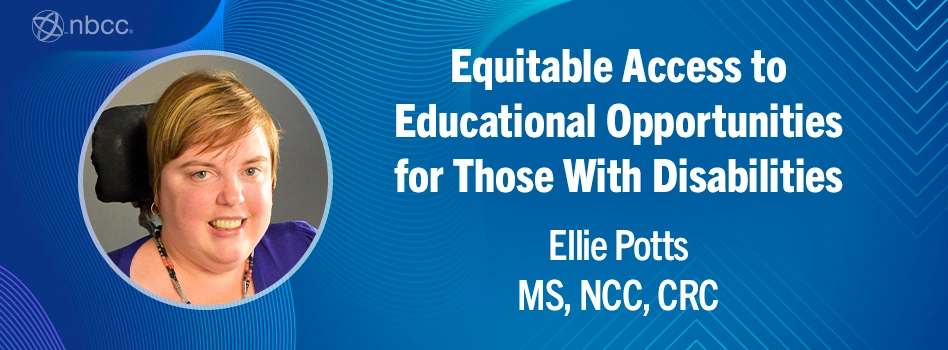
One of the many responsibilities of a counselor is to help encourage and support their clients’ academic and career aspirations and development. For clients with disabilities or other special needs, this may not always be as straightforward.
Advocacy is at the forefront of the counseling profession, and advocating for equitable access in educational settings is crucial in helping those with disabilities realize their academic and professional potential.
According to the American School Counselor Association (ASCA), there are various ways counselors can support those with disabilities. These include staying abreast of the legal and ethical mandates in supporting those with disabilities, helping recognize both their strengths and challenges, connecting them to community resources and group support networks, and encouraging their own self-advocacy skills and voice. These approaches can help navigate systemic barriers and difficult experiences inflicted on them due to stigma and ignorance surrounding disabilities.
Ellie Potts, MS, NCC, CRC, is a counseling professional living with cerebral palsy. She requires the use of a motorized wheelchair and assistance with physical tasks. Therefore, she has immense expertise and experiences with accessibility in education and counseling. She recently shared her unique perspective on how counselors can advocate for equitable access in educational settings for those with disabilities.
First and foremost, Potts asserts that those with disabilities are just like everyone else.
“EVERY student is unique, and one with a disability is more than just their disability. Counselors often assume that the problems of someone with a disability are always related to the disability, but this is not always the case,” says Potts. “Think about their struggles outside the context of their disability. Their developmental challenges are often the same but with an extra layer of complexity related to their identity as someone with a disability.”
Potts gives a compelling example. If a blind person seeks counseling for depression, the counselor should treat them the same as any other client. If the client states that the cause of their depression is family stress, their answer should be respected, and the cause should not be assumed to be their blindness.
Potts recognizes there is a lot to consider regarding the physical challenges and limitations in educational settings, though. Access to spaces is simply something that needs more attention. However, while obtaining physical access may be necessary, counselors should recognize that the desire to feel included is of equal importance.
“Being inclusive requires thinking about each part of the day and how it can be flexible and adaptable to the needs of each client. True inclusion means more than just having a ramp at the entrance,” says Potts.
Potts reminisces being 16 years old and the excitement and anxieties her peers felt about driving. She shared similar feelings, even though she knew she couldn’t drive by herself. It was her desire for independence that was the same. She wanted to find ways to build that independence in her own life however she could. Counselors can help strategize ways to create this independence around a client’s disability instead of solely focusing on advocating for the physical and tangible amenities.
“The most important thing is to treat people with disabilities with respect. Counselors don’t necessarily need specific credentials or training to know how to advocate for those with disabilities. The best thing is to just ask the individual client what they need and respect what they tell you,” concludes Potts.
Ellie Potts, MS, NCC, CRC, is a fourth-year doctoral student in counselor education and supervision at the University of Georgia, where she is also a UCEDD trainee and student in the graduate disability studies and graduate qualitative research certificate programs. She received a master’s degree in clinical rehabilitation counseling at Georgia State University and is a former Georgia LEND fellow. Potts’s passion is improving access and opportunities for people with disabilities in education, counseling, and transition services. As someone with a disability, Potts is driven by her personal experiences to help make the world a more equitable place.